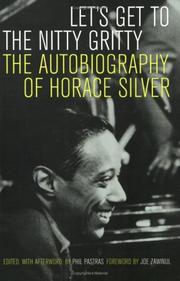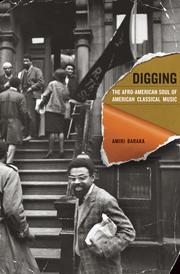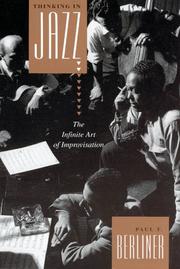| Listing 1 - 7 of 7 |
Sort by
|
Book
ISBN: 9782213709871 2213709874 Year: 2020 Publisher: Paris: Fayard,
Abstract | Keywords | Export | Availability | Bookmark
 Loading...
Loading...Choose an application
- Reference Manager
- EndNote
- RefWorks (Direct export to RefWorks)
" Le jazz ? C'est quatre mots, dit Miles Davis. Louis - Armstrong - Charlie - Parker. " Parker incarne le jazz dans sa liberté, son invention, ses beautés. Le saxophoniste alto originaire de Kansas City exerce une influence déterminante sur le jazz tel qu'on le connaît depuis ces 60 dernières années. Il innove sur tous les plans: le découpage rythmique, l'audace harmonique, l'invention mélodique. C'est un musicien en liberté, donc excessif, marginal, au parcours musical fulgurant (seulement vingt ans, de 1935 à 1955), troué d'envolées sublimes et de descentes aux enfers abyssales. Il est la figure centrale d'une révolution. L'éruption du bebop, son irruption fracassante dans les années 1940 à New York, est le grand tournant de l'histoire du jazz. Cette biographie est non seulement le livre le plus complet sur Charlie Parker publié en France (témoignages de musiciens : Sonny Rollins, Ornette Coleman, Joe Lovano, Steve Coleman, Martial Solal, Michel Portal ; un cahier photos), c'est aussi le récit précis de cette aventure musicale qui a défrayé la chronique et fait rupture dans l'histoire de la musique noire-américaine : le bebop. Franck Médioni est journaliste et écrivain. Il a collaboré à Jazz magazine et a été producteur de l'émission " Jazzististiques " sur France Musique. Parmi une œuvre foisonnante dont plusieurs livres d'entretiens (Martial Solal, Joëlle Léandre, Sonny Rollins, Daniel Humair), il est l'auteur de John Coltrane, 80 musiciens de jazz témoignent (Actes Sud), Miles Davis, 80 musiciens de jazz témoignent (Actes Sud), Jimi Hendrix (Gallimard), George Gershwin (Gallimard) et John Coltrane, l'amour suprême (Le Castor astral).
Parker, Charlie --- Parker, Charles Christopher --- Biography --- Charlie, Parker, - 1920-1955 --- Parker, Christopher Charles
Article
Year: 1950 Publisher: Heemstede [Uitgever niet geïdentificeerd]
Abstract | Keywords | Export | Availability | Bookmark
 Loading...
Loading...Choose an application
- Reference Manager
- EndNote
- RefWorks (Direct export to RefWorks)
Jazz --- Dutch periodicals --- Tijdschriften --- Sandy, Herman --- Ellington, Duke --- Noone, Jimmie --- Bigard, Barney --- Davis, Kay --- Hodges, Johnny --- Charlie Parker Quartet --- Art Tatum Trio
Book
ISBN: 1787440370 1847011551 1847011772 Year: 2017 Publisher: Suffolk : Boydell & Brewer,
Abstract | Keywords | Export | Availability | Bookmark
 Loading...
Loading...Choose an application
- Reference Manager
- EndNote
- RefWorks (Direct export to RefWorks)
Pim Higginson draws on race theory, aesthetics, cultural studies, musicology, and postcolonial studies to examine the convergence of aesthetics and race in Western thought and to explore its impact on Francophone African literature. France's "tumulte noir," the jazz craze between the two world wars, consolidated an aesthetic model present in Western philosophy since Plato that coalesced into French "scientific" racism over the 19th century; a model which formalized the notion of music as black. France's "jazzophilia" codified what the author names the "racial score:" simultaneously an archive and script that, in defining jazz as "black music," has had wide-reaching effects on contemporary perceptions of the artistic and political efficacy of black writers, musicians, and their aesthetic productions. Reading avant-garde French writers Sartre and Soupault to prize-winning Francophone authors Congolese Emmanuel Dongala to Cameroonian Léonora Miano, Scoring Race explores how jazz masters Louis Armstrong, Duke Ellington, Charlie Parker, and John Coltrane became touchstones for claims to African authorship and aesthetic subjectivity across the long twentieth century. This volume focuses on how this naturalization of black musicality occurred and its impact on Francophone African writers and filmmakers for whom the idea of their own essential musicality represented an epistemological obstacle. Despite this obstacle, because of jazz's profound importance to diaspora aesthetics, as well as its crucial role in the French imaginary, many African writers have chosen to make it a structuring principle of their literary projects. How and why, Pim Higginson asks, did these writers and filmmakers approach jazz and its participation in and formalization of the "racial score"? To what extent did they reproduce the terms of their own systematic expulsion into music and to what extent, in their impossible demand for writing (or film-making), did they arrive at tactical means of working through, around, or beyond the strictures of their assumed musicality? Pim Higginson is Professor of Global French Studies at the University of New Mexico, Albuquerque.
African literature (French) --- French literature --- History and criticism. --- African authors --- Jazz in literature. --- 1900-1999 --- Frankophones Afrika. --- Französischsprachiges Afrika --- Französisches Sprachgebiet --- Afrika --- African American music. --- Charlie Parker. --- Duke Ellington. --- Emmanuel Dongala. --- France. --- French. --- John Coltrane. --- Leonora Miano. --- Louis Armstrong. --- Sartre. --- cultural studies. --- jazz in Paris. --- jazz. --- musicology. --- race.

ISBN: 1282360442 9786612360442 052094142X 1598759299 9780520941427 1423752651 9781423752653 9780520253926 0520253922 9781598759297 9780520243743 0520243749 9781282360440 6612360445 Year: 2006 Publisher: Berkeley, Calif. : University of California Press,
Abstract | Keywords | Export | Availability | Bookmark
 Loading...
Loading...Choose an application
- Reference Manager
- EndNote
- RefWorks (Direct export to RefWorks)
Horace Silver is one of the last giants remaining from the incredible flowering and creative extension of bebop music that became known as "hard bop" in the 1950's. This freewheeling autobiography of the great composer, pianist, and bandleader takes us from his childhood in Norwalk, Connecticut, through his rise to fame as a musician in New York, to his comfortable life "after the road" in California. During that time, Silver composed an impressive repertoire of tunes that have become standards and recorded a number of classic albums. Well-seasoned with anecdotes about the music, the musicians, and the milieu in which he worked and prospered, Silver's narrative-like his music-is earthy, vernacular, and intimate. His stories resonate with lessons learned from hearing and playing alongside such legends as Art Blakey, Charlie Parker, and Lester Young. His irrepressible sense of humor combined with his distinctive spirituality make his account both entertaining and inspiring. Most importantly, Silver's unique take on the music and the people who play it opens a window onto the creative process of jazz and the social and cultural worlds in which it flourishes. Let's Get to the Nitty Gritty also describes Silver's spiritual awakening in the late 1970's. This transformation found its expression in the electronic and vocal music of the three-part work called The United States of Mind and eventually led the musician to start his own record label, Silveto. Silver details the economic forces that eventually persuaded him to put Silveto to rest and to return to the studios of major jazz recording labels like Columbia, Impulse, and Verve, where he continued expanding his catalogue of new compositions and recordings that are at least as impressive as his earlier work.
Pianists --- Jazz musicians --- Silver, Horace, --- 526 --- Monografieën componisten --- 20th century american culture. --- 20th century american music history. --- african american culture. --- african american music. --- american composer. --- american jazz pianist. --- american music history. --- art blakey. --- artists. --- autobiography. --- bandleader. --- bands. --- bebop. --- blues. --- bop music. --- charlie parker. --- entertainment. --- gospel music. --- hard bop. --- jazz music. --- jazz. --- lester young. --- music arranger. --- music. --- musicians. --- performing arts. --- record label. --- rhythm and blues. --- silverto. --- singers. --- spiritual awakening. --- spirituality. --- the united states of mind.

ISBN: 1282360868 9786612360862 0520943090 9780520943094 9780520257153 0520257154 9780520257153 9781282360860 6612360860 9780520265820 0520265823 Year: 2009 Publisher: Berkeley : University of California Press,
Abstract | Keywords | Export | Availability | Bookmark
 Loading...
Loading...Choose an application
- Reference Manager
- EndNote
- RefWorks (Direct export to RefWorks)
For almost half a century, Amiri Baraka has ranked among the most important commentators on African American music and culture. In this brilliant assemblage of his writings on music, the first such collection in nearly twenty years, Baraka blends autobiography, history, musical analysis, and political commentary to recall the sounds, people, times, and places he's encountered. As in his earlier classics, Blues People and Black Music, Baraka offers essays on the famous-Max Roach, Charlie Parker, Miles Davis, John Coltrane-and on those whose names are known mainly by jazz aficionados-Alan Shorter, Jon Jang, and Malachi Thompson. Baraka's literary style, with its deep roots in poetry, makes palpable his love and respect for his jazz musician friends. His energy and enthusiasm show us again how much Coltrane, Albert Ayler, and the others he lovingly considers mattered. He brings home to us how music itself matters, and how musicians carry and extend that knowledge from generation to generation, providing us, their listeners, with a sense of meaning and belonging.
African Americans --- Music --- African American musicians. --- History and criticism. --- african american culture. --- african american history. --- african american music. --- alan shorter. --- america popular song. --- american classical music. --- autobiography. --- black aesthetic. --- blues aesthetic. --- bruce springsteen. --- charlie parker. --- duke ellington. --- fred hopkins. --- great american song book. --- jazz criticism. --- jazz music. --- jazz. --- john coltrane. --- jon jang. --- malachi thompson. --- max roach. --- miles davis. --- music. --- musical analysis. --- musicians. --- political commentary. --- political history. --- rhythm. --- social change. --- wynton marsalis.

ISBN: 0226043800 1282538705 9786612538704 0226044521 Year: 1994 Publisher: Chicago : University of Chicago Press,
Abstract | Keywords | Export | Availability | Bookmark
 Loading...
Loading...Choose an application
- Reference Manager
- EndNote
- RefWorks (Direct export to RefWorks)
A landmark in jazz studies, Thinking in Jazz reveals as never before how musicians, both individually and collectively, learn to improvise. Chronicling leading musicians from their first encounters with jazz to the development of a unique improvisatory voice, Paul Berliner documents the lifetime of preparation that lies behind the skilled improviser's every idea. The product of more than fifteen years of immersion in the jazz world, Thinking in Jazz combines participant observation with detailed musicological analysis, the author's experience as a jazz trumpeter, interpretations of published material by scholars and performers, and, above all, original data from interviews with more than fifty professional musicians: bassists George Duvivier and Rufus Reid; drummers Max Roach, Ronald Shannon Jackson, and Akira Tana; guitarist Emily Remler; pianists Tommy Flanagan and Barry Harris; saxophonists Lou Donaldson, Lee Konitz, and James Moody; trombonist Curtis Fuller; trumpeters Doc Cheatham, Art Farmer, Wynton Marsalis, and Red Rodney; vocalists Carmen Lundy and Vea Williams; and others. Together, the interviews provide insight into the production of jazz by great artists like Betty Carter, Miles Davis, Dizzy Gillespie, Coleman Hawkins, and Charlie Parker. Thinking in Jazz overflows with musical examples from the 1920s to the present, including original transcriptions (keyed to commercial recordings) of collective improvisations by Miles Davis's and John Coltrane's groups. These transcriptions provide additional insight into the structure and creativity of jazz improvisation and represent a remarkable resource for jazz musicians as well as students and educators. Berliner explores the alternative ways-aural, visual, kinetic, verbal, emotional, theoretical, associative-in which these performers conceptualize their music and describes the delicate interplay of soloist and ensemble in collective improvisation. Berliner's skillful integration of data concerning musical development, the rigorous practice and thought artists devote to jazz outside of performance, and the complexities of composing in the moment leads to a new understanding of jazz improvisation as a language, an aesthetic, and a tradition. This unprecedented journey to the heart of the jazz tradition will fascinate and enlighten musicians, musicologists, and jazz fans alike.
Jazz --- Improvisation (Music) --- Jazz musicians --- jazz, improvisation, creativity, music, ethnomusicology, musicology, trumpet, miles davis, coltrane, performance, composition, bands, venues, rhythm section, rehearsal, precomposition, community, charlie parker, coleman hawkins, dizzy gillespie, betty carter, vea williams, carmen lundy, red rodney, wynton marsalis, art farmer, doc cheatham, curtis fuller, james moody, lee konitz, lou donaldson, barry harris, tommy flanagan, emily remler, akira tana, ronald shannon jackson, max roach, rufus reid, george duvivier, nonfiction, analysis. --- History and criticism.
Multi
ISBN: 9781137539403 1137539402 Year: 2016 Publisher: London : Palgrave Macmillan UK : Imprint: Palgrave Macmillan,
Abstract | Keywords | Export | Availability | Bookmark
 Loading...
Loading...Choose an application
- Reference Manager
- EndNote
- RefWorks (Direct export to RefWorks)
Irish detective fiction has enjoyed an international readership for over a decade, appearing on best-seller lists across the globe. But its breadth of hard-boiled and amateur detectives, historical fiction, and police procedurals has remained somewhat marginalized in academic scholarship. Exploring the work of some of its leading writers—including Peter Tremayne, John Connolly, Declan Hughes, Ken Bruen, Brian McGilloway, Stuart Neville, Tana French, Jane Casey, and Benjamin Black—The Contemporary Irish Detective Novel opens new ground in Irish literary criticism and genre studies. It considers the detective genre’s position in Irish Studies and the standing of Irish authors within the detective novel tradition.
Fiction --- English literature --- Literature --- detectiveromans --- fantasy --- literatuur --- Engelse literatuur --- French, Tana --- Tremayne, Peter --- Sister Fidelma [Fictieve figuur] --- Connolly, John --- Charlie Parker [Fictieve figuur] --- Hughes, Declan --- Ed Loy [Fictieve figuur] --- Bruen, Ken --- Jack Taylor [Fictieve figuur] --- McGilloway, Brian --- Benedict Devlin [Fictieve figuur] --- Neville, Stuart --- Casey, Jane --- Maeve Kerrigan [Fictieve figuur] --- Black, Benjamin --- Quirke [Fictieve figuur] --- anno 1900-1999 --- anno 2000-2099 --- Belfast --- Great Britain --- Dublin --- Ireland --- Belfast [Northern Ireland] --- Dublin [Ireland, city] --- Literature, Modern—20th century. --- Literature, Modern—21st century. --- British literature. --- Fiction. --- Contemporary Literature. --- British and Irish Literature.
| Listing 1 - 7 of 7 |
Sort by
|

 Search
Search Feedback
Feedback About UniCat
About UniCat  Help
Help News
News